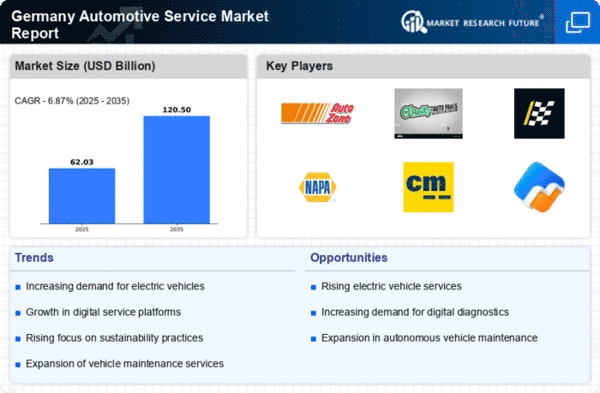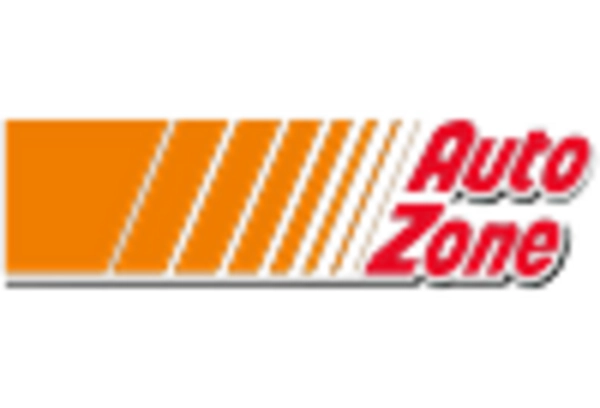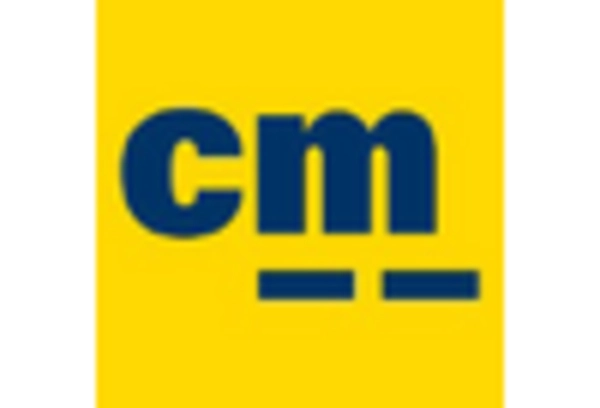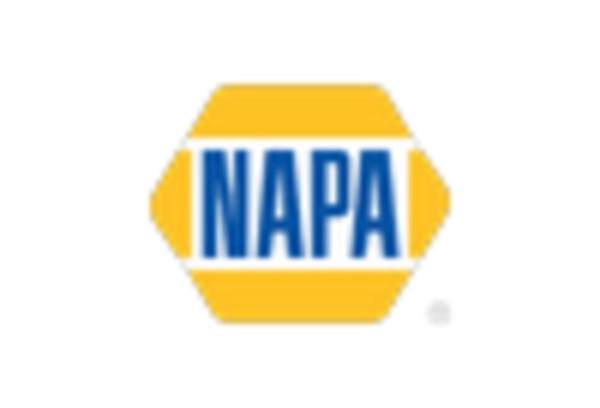Growing Vehicle Ownership Rates
The The automotive service sector is significantly influenced by the rising vehicle ownership rates in Germany. is significantly influenced by the rising vehicle ownership rates in Germany. As more individuals acquire vehicles, the demand for maintenance and repair services naturally escalates. Recent statistics indicate that vehicle ownership in Germany has increased by over 3% in the past year, leading to a corresponding rise in service demand. This trend is particularly pronounced among electric and hybrid vehicles, which require specialized services. Consequently, service providers are expanding their offerings to cater to this growing segment. The automotive service market is thus positioned for robust growth, as the increasing number of vehicles on the road necessitates ongoing maintenance and repair services.
Expansion of Aftermarket Services
The The automotive service sector is experiencing a notable expansion in aftermarket services. is experiencing a notable expansion in aftermarket services, driven by consumer demand for personalized and specialized offerings. In Germany, there is a growing trend towards customization and enhancement of vehicles, leading to increased interest in aftermarket modifications and upgrades. This shift is prompting service providers to diversify their service portfolios, including performance tuning, aesthetic modifications, and advanced technology installations. The aftermarket segment is projected to grow at a rate of approximately 6% annually, reflecting the increasing willingness of consumers to invest in their vehicles. Consequently, the automotive service market is likely to benefit from this trend, as service providers capitalize on the expanding opportunities within the aftermarket sector.
Increased Consumer Awareness and Expectations
The The automotive service sector is witnessing a shift in consumer behavior, characterized by heightened awareness and expectations regarding service quality. is witnessing a shift in consumer behavior, characterized by heightened awareness and expectations regarding service quality. German consumers are becoming more informed about their vehicle maintenance needs, often researching service options before making decisions. This trend is driving service providers to enhance their offerings, focusing on transparency, quality, and customer satisfaction. Additionally, the rise of online reviews and social media platforms has empowered consumers to share their experiences, further influencing service standards. As a result, the automotive service market is adapting to meet these evolving consumer demands, which may lead to increased competition among service providers.
Regulatory Changes and Compliance Requirements
The The automotive service sector is being shaped by evolving regulatory changes and compliance requirements in Germany. is being shaped by evolving regulatory changes and compliance requirements in Germany. Stricter emissions regulations and safety standards are compelling service providers to adapt their practices. For instance, the introduction of new environmental regulations mandates that service centers implement eco-friendly practices, which may involve investing in cleaner technologies and waste management systems. This shift not only impacts operational costs but also influences consumer preferences, as customers increasingly seek services that align with sustainability goals. As a result, the automotive service market is likely to see a transformation in service offerings, with an emphasis on compliance and environmental responsibility.
Technological Advancements in Automotive Repair
The The automotive service sector is experiencing a notable shift due to rapid technological advancements. is experiencing a notable shift due to rapid technological advancements. Innovations such as advanced diagnostic tools and automated repair systems are enhancing service efficiency and accuracy. In Germany, the integration of artificial intelligence and machine learning in service operations is becoming increasingly prevalent. This trend is expected to drive the market, as it allows service providers to offer more precise and timely repairs. Furthermore, the adoption of telematics systems enables real-time monitoring of vehicle performance, which can lead to proactive maintenance. As a result, the automotive service market is projected to grow by approximately 5.5% annually, reflecting the increasing reliance on technology in service delivery.
















